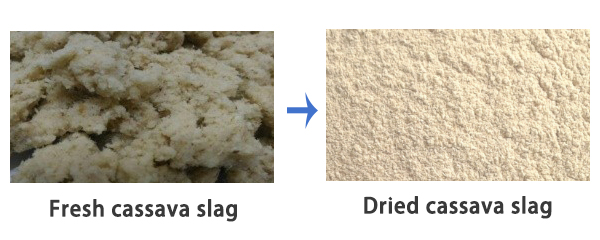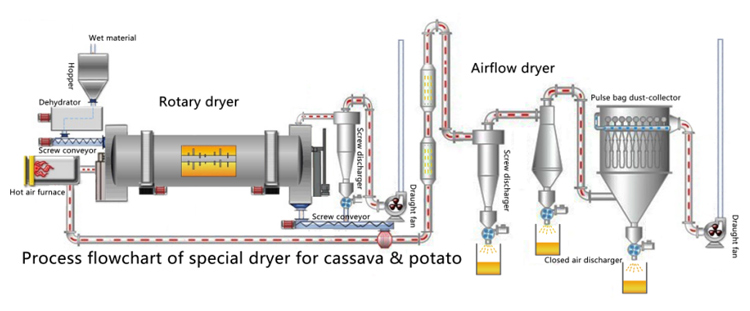1. Introduction
Cassava pulp, potato residue is the main by-products of the production of starch, alcohol residue, moisture content is about 80%, as for high moisture content, heavy viscosity, with the traditional drying process equipment, drying temperature is high, slag starch Gelatinization chemical reaction, dextrin clogging material particles pores, water evaporation does not come out, the particles surface turned yellowish black, "outside the coke within the soft", a serious impact on the sale of dry residue; drying temperature is low, t the moisture cannot drying below 15 % at all, dryer sticky wall, gelatinization, agglomeration, drying equipment can not do normal production,this will lead to the impaired interest of the customers.
Dingli brand starch slag dryer is based on the research and development for characteristics of raw material such as cassava, potato slag, and after a few sets of dryer producing experience, which can drying all kinds of potato residue below 12% in one time. The equipment used by the company's "mechanical dehydration + drum drying + pulse air drying " special chinese patent technology, an effective solution to the traditional dryer which can not dry cassava, potato residue problems, drying material with perfect color, good quality, production line of energy saving and environmental protection ,with safe and stable operation,which praised by many new and old customers.

Material flow : 75-85% moisture content material first with special dehydration machine removing a part of moisture, the moisture removed around 68%, then send into the dryer by screw conveyor to realize downstream drying. Under the effect of inner shoveling plate, materials are took and scattered constantly, and move in spiral forward method. Inside mixing blade device will be fully stirred and crushed material, material and hot air through full heat exchange, the rapid evaporation of water vaporization, reaching about 35%, discharged by the screw conveyor, then send into the semi-wet material crusher, crushed material size below 1mm, then into pulse air drying process, within 3-10s the material quickly removed to 14% by the cyclone discharger and Pulse bag dust collector recovery dry powder, exhaust emissions amount to the national standard requirement, to complete the entire drying process.
Air Flow: The air through hot blast stove fan inflating, the air enters into the hot blast stove for combustion heating. Its temperature reaches up to 600-850℃, then it is inhaled by the dryer induced draft fan absorted to dry material and evaporate water. Through the heat exchange drying the material. When temperature decreases to 55-85℃, it is discharged out of the dryer. Wet dust are discharged on standard through the cyclone and the pulse dust collector purifying and emission.

1. Can achieve intelligent control, one-button operation, automatic adjustment of operating parameters, the dryer is always in the best condition to run, to ensure that the drying of the material moisture uniform and stable, bright colors, nutrients remain unchanged.
2. Built-in mixing blade device will be fully stirred and broken material, material and hot temperament heat exchange fully, the equipment unit capacity increased by 50% , fuel energy consumption reduced by 30% ;
3. Equipment with less malfunction, low maintenance costs, low energy consumption;
4. Drying products are powder, water evenly, bright color, drying process does not lose the material nutrients;
5. Starch residue drying production line using a special scattering and crushing device to ensure good dryer drying effect.
6. Adopts a unique sealed insulation device, effectively reducing the heat loss of the drying system;
7. The system sealing performance is good, and with a complete dust removal device, no dust spill, the operating environment is good;
8. The entire drying system using electrical centralized control, hot air temperature with automatic adjustment, a high degree of automation, easy to operate;
9. After the drying process, it can be equipped with crushing, mixing, granulation, packing and other follow-up section to produce potato residue pellet feed products.



